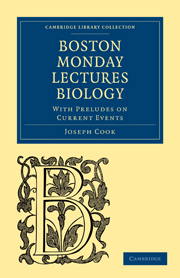Book contents
- Frontmatter
- INTRODUCTION
- Contents
- LECTURES
- I HUXLEY AND TYNDALL ON EVOLUTION
- II THE CONCESSIONS OF EVOLUTIONISTS
- III THE CONCESSIONS OF EVOLUTIONISTS
- IV THE MICROSCOPE AND MATERIALISM
- V LOTZE, BEALE, AND HUXLEY ON LIVING TISSUES
- VI LIFE, OR MECHANISM—WHICH?
- VII DOES DEATH END ALL? INVOLUTION AND EVOLUTION
- VIII DOES DEATH END ALL? THE NERVES AND THE SOUL
- IX DOES DEATH END ALL? INSTINCT IMMORTAL?
- X DOES DEATH END ALL? BAIN'S MATERIALISM
- XI AUTOMATIC AND INFLUENTIAL NERVES
- XII EMERSON'S VIEWS ON IMMORTALITY
- XIII ULRICI ON THE SPIRITUAL BODY
- INDEX
I - HUXLEY AND TYNDALL ON EVOLUTION
Published online by Cambridge University Press: 05 October 2010
- Frontmatter
- INTRODUCTION
- Contents
- LECTURES
- I HUXLEY AND TYNDALL ON EVOLUTION
- II THE CONCESSIONS OF EVOLUTIONISTS
- III THE CONCESSIONS OF EVOLUTIONISTS
- IV THE MICROSCOPE AND MATERIALISM
- V LOTZE, BEALE, AND HUXLEY ON LIVING TISSUES
- VI LIFE, OR MECHANISM—WHICH?
- VII DOES DEATH END ALL? INVOLUTION AND EVOLUTION
- VIII DOES DEATH END ALL? THE NERVES AND THE SOUL
- IX DOES DEATH END ALL? INSTINCT IMMORTAL?
- X DOES DEATH END ALL? BAIN'S MATERIALISM
- XI AUTOMATIC AND INFLUENTIAL NERVES
- XII EMERSON'S VIEWS ON IMMORTALITY
- XIII ULRICI ON THE SPIRITUAL BODY
- INDEX
Summary
“None of the processes of Nature, since the time when Nature began, have produced the slightest difference in the properties of any molecule. We are, therefore, unable to ascribe either the existence of the molecules, or the identity of their properties, to the operation of any of the causes which we call natural. The quality of each molecule gives it the essential character of a manufactured article, and precludes the idea of its being eternal and self-existent.”
—Professor Clerk Maxwell, “Lecture delivered before the British Association at Bradford,” in Nature, vol. viii. p. 441.“There is a wider teleology which is not touched by the doctrine of evolution, but is actually based upon the fundamental proposition of evolution. The teleological and the mechanical views of Nature are not necessarily mutually exclusive. The teleologist can always defy the evolutionist to disprove that the primordial molecular arrangement was not intended to evolve the phenomena of the universe.”
—Professor T. H. Huxley in The Academy for October 1869, No. I, p. 13.In 1868 Professor Huxley, in an elaborate paper in the “Microscopical Journal,” announced his belief that the gelatinous substance found in the ooze of the beds of the deep seas is a sheet of living matter extending around the globe. The stickiness of the deep-sea mud, he maintained, is due to innumerable lumps of a transparent, jelly-like substance, each lump consisting of granules, coccoliths, and foreign bodies, embedded in a transparent, colourless, and structureless matrix.
- Type
- Chapter
- Information
- BiologyWith Preludes on Current Events, pp. 1 - 17Publisher: Cambridge University PressPrint publication year: 2009First published in: 1879



